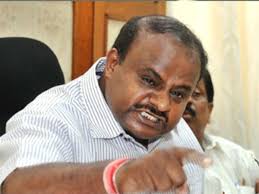Bengaluru, Mar 20: JD(S) leader H D Kumaraswamy on Saturday accused Chief Minister Siddaramaiah and Congress legislators from Kolar and Chikkaballapur of siphoning off money meant for the Yettinahole drinking water project.
 Addressing the JD(S) workers at the Palace Grounds, he said the government had claimed to have already spent Rs 1,800 crore on the project, but nothing had been done on ground. “Except for the pipeline-laying work, nothing has happened. Where did all the money go? A chunk of this money appears to have reached the pockets of the chief minister and the Kolar legislators,” he added.
Addressing the JD(S) workers at the Palace Grounds, he said the government had claimed to have already spent Rs 1,800 crore on the project, but nothing had been done on ground. “Except for the pipeline-laying work, nothing has happened. Where did all the money go? A chunk of this money appears to have reached the pockets of the chief minister and the Kolar legislators,” he added.
The Congress government has been looting money in the name of development, especially the irrigation and the drinking water projects. Siddaramaiah has weakened the Karnataka Lokayukta in order to protect himself and his tainted ministerial colleagues, he said.
The money borrowed by the government for the sake of development is being misused. The same money will be used during elections in order to buy votes. This is precisely the reason why no development is happening in Bengaluru despite the government earmarking crores of rupees in the budget, he said.
Kumaraswamy charged Siddaramaiah with completely neglecting the ailing agriculture sector in the 2016-17 budget and promised to waive off all kinds of farm loans if his party was voted to power in the 2018 Assembly elections.





Comments
Kswamy is upset he did not divert that money to his account....hopeless politicians....
Add new comment